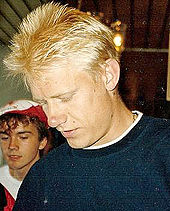Peter Schmeichel
He also represented Gladsaxe-Hero, Hvidovre, Brøndby, Sporting CP, Aston Villa and Manchester City in a career that lasted from 1981 until 2003 and yielded 24 trophies.
In 2001, Schmeichel won a public poll held by Reuters, in which the majority of the 200,000 participants voted him as the best goalkeeper ever, ahead of Lev Yashin and Gordon Banks.
Schmeichel's son, Kasper, is also a professional goalkeeper, currently playing for Scottish side Celtic and the Danish national team.
[10] He spent his early years in the town of Buddinge, Copenhagen, and began his football career playing for a team in the adjacent suburb of Høje-Gladsaxe.
[11] After a two-and-a-half-year unbeaten run, Schmeichel was approached by BK Hero, a team from a few divisions above Høje-Gladsaxe and with one of the largest youth football schemes in Denmark.
[13] Eventually graduating to the Gladsaxe-Hero senior squad, Schmeichel met his first mentor in Svend Aage Hansen, the first team coach at the club, and later to become his father-in-law.
With Gladsaxe-Hero already relegated from the Danish Third Division with three games to go, Hansen promoted Schmeichel and six others from the youth team for a match against IF Skjold Birkerød.
The climax of his Brøndby career would come in the 1990–91 UEFA Cup, which saw Schmeichel as an important part of the team that reached the semi-finals, keeping seven clean sheets in the competition.
[23] In the 1992–93 season, 22 clean sheets from Schmeichel helped United win the Premier League championship, the first time the club had won England's top trophy in 26 years.
[22] Schmeichel and United repeated the Premier League championship win at the end of the season, also capturing the FA Cup.
[24] United were denied a domestic treble by losing the 1994 League Cup Final to Aston Villa, a game for which Schmeichel was suspended.
[24] With his departure, Manchester United had trouble finding a replacement for him, going through several high-profile goalkeepers including Mark Bosnich, Massimo Taibi, Fabien Barthez, Tim Howard and Roy Carroll, before finally buying Edwin van der Sar, who Sir Alex Ferguson considered the best goalkeeper to have played for the club since Schmeichel.
[34] Schmeichel returned to England with Aston Villa in July 2001, signing a one-year contract with the option to extend it by a further year.
[35] On 20 October 2001, Schmeichel became the first goalkeeper to score a Premier League goal, in a 3–2 defeat away to Everton;[18] this feat has been repeated just five times since: by Blackburn Rovers' Brad Friedel on 21 February 2004, also from a corner kick; by Tottenham Hotspur's Paul Robinson from a free-kick on 17 March 2007; by Everton's Tim Howard on 4 January 2012; by Stoke City's Asmir Begović on 2 November 2013; and by Liverpool's Alisson Becker on 16 May 2021.
[36] Schmeichel left Aston Villa after one season after he fell behind Peter Enckelman in the club's pecking order under new manager Graham Taylor, who had replaced John Gregory in February 2002.
[38][39] The move was described as a "shock" given his former allegiance to United, with manager Kevin Keegan stating he only needed 20 minutes to convince him to join City.
[41][42] In the final derby to be played at Maine Road, caught live on television as the two teams were about to come out of the tunnel, United's Gary Neville refused to shake Schmeichel's hand before City went on to win the game 3–1.
"[43] Schmeichel announced his retirement from football in April 2003, with City replacing him with fellow veteran keeper David Seaman.
[18] Under new national manager Richard Møller Nielsen, Schmeichel was Denmark's starting goalkeeper at the Euro 92 tournament which they went on to win.
[18] Schmeichel made a string of important saves during the tournament,[19] keeping a clean sheet in Denmark's opening 0–0 draw against England, and producing decisive stops against Eric Cantona and Jean-Pierre Papin in a 2–1 win over France to advance to the last four.
[18] In the semi-finals against defending champions the Netherlands, following a 2–2 draw after extra time, he stopped a penalty kick from Marco van Basten – the only miss of the shoot-out – which meant Denmark advanced to the final in a 5–4 shootout victory.
[47] Schmeichel also made several decisive saves in the final, and even held a cross with one hand, keeping a clean sheet in his nation's 2–0 victory over Germany.
[18][50] Under national manager Bo Johansson, Schmeichel was a part of the Danish squad at the 1998 FIFA World Cup, during which he overtook Morten Olsen as the most-capped player for Denmark.
[18] He scored his only goal for the Danish national team, a penalty kick in a 2–2 draw against Belgium, in a June 2000 warm-up match for Euro 2000.
He announced his retirement from the national team in February 2001,[52] and played his final match (his 129th international appearance)[18] two months later, captaining the side in a 3–0 friendly win over Slovenia at Copenhagen's Parken Stadium; he was substituted in the 65th minute to a standing ovation, replaced by long-time back-up Peter Kjær.
[nb 5] A courageous and fierce competitor, he was a vocal presence in goal, known for his strong character, mentality, ability to organise his defence, and leadership from the back, as well as for his criticism of his defenders whenever they made mistakes.
He then began hosting live UEFA Champions League matches on Danish television channel TV3+, with Preben Elkjær and Brian Laudrup the studio pundits.
Schmeichel was a contestant on the 2006 series of the BBC's popular Saturday night TV programme Strictly Come Dancing, but was voted out by the public on his 43rd birthday.
